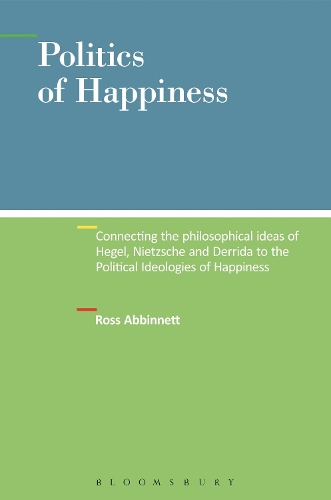
Politics of Happiness: Connecting the Philosophical Ideas of Hegel, Nietzsche and Derrida to the Political Ideologies of Happiness
(Hardback)
Available Formats
Publishing Details
Politics of Happiness: Connecting the Philosophical Ideas of Hegel, Nietzsche and Derrida to the Political Ideologies of Happiness
By (Author) Dr. Ross Abbinnett
Bloomsbury Publishing PLC
Bloomsbury Academic USA
14th March 2013
United States
Classifications
Tertiary Education
Non Fiction
Social and political philosophy
320.011
Physical Properties
Hardback
208
481g
Description
This unique and engaging study argues that the Western concern with achieving happiness should be understood in terms of its relationship to the political ideologies that have emerged since the Enlightenment. To do so, each chapter examines the place that happiness occupies in the construction of ideologies that have formed the political terrain of the West, including liberalism, postmodernism, socialism, fascism, and religion. Throughout, Hegel's phenomenology, Nietzsche's genealogy, and Derrida's account of deconstruction as reactions to modernization are used to show that the politics of happiness are always a clash of fundamental ideas of belonging, overcoming, and ethical responsibility. Stressing that the concept of happiness lies at the foundation of political movements, the book also looks at its place in the current global order, analyzing the emergence of such ideas as affective democracy that challenge the conventional notions of privatized, acquisitive happiness. Written in a clear manner, the work will appeal to political theory students and researchers looking for a critical and historical account of contemporary debates about the nature of happiness and ideology.
Reviews
"Can we be happy in a world marked by catastrophe Should we try What is happiness anyway In this subtle and entrancing work Ross Abbinnett thinks deeply and profoundly about these questions. He draws on the European philosophical tradition to show why happiness is important and in so doing rescues happiness from the banalities of the new utilitarianism. This is an important book." - Keith Tester, Professor of Sociology, The University of Hull, UK
"Everybody wants to be happy. Abbinnett's achievement is to connect this interest to the big animals of philosophy and to the big ideas of liberalism , communism and fascism. The result is as stimulating as it is innovative. This is a very interesting book." -Peter Beilharz, Professor of Sociology, La Trobe University, Australia
Author Bio
Ross Abbinnett is Senior Lecturer in Social and Political Theory, University of Birmingham, UK. His main research interests lie in the areas of social and political theory, culture and aesthetics, and technology and society. He has published extensively in these fields, including Truth and Social Science (Sage, 1998), Culture and Identity (Sage, 2003), and Marxism After Modernity (Palgrave, 2006).
